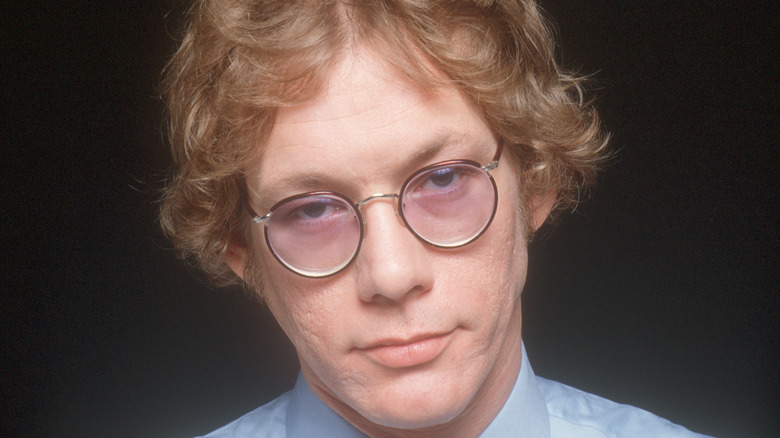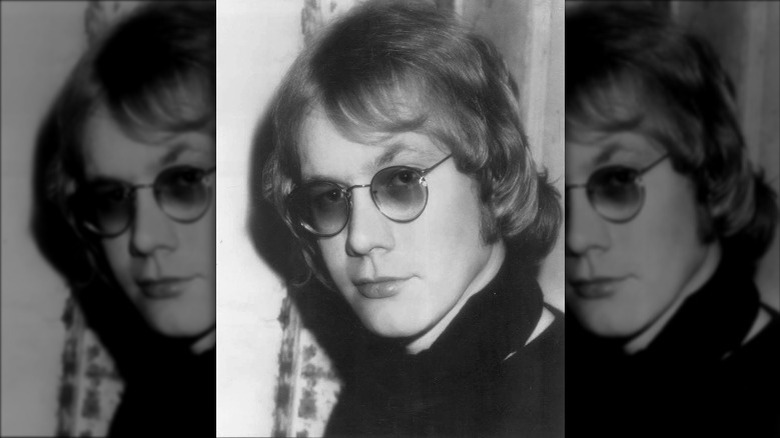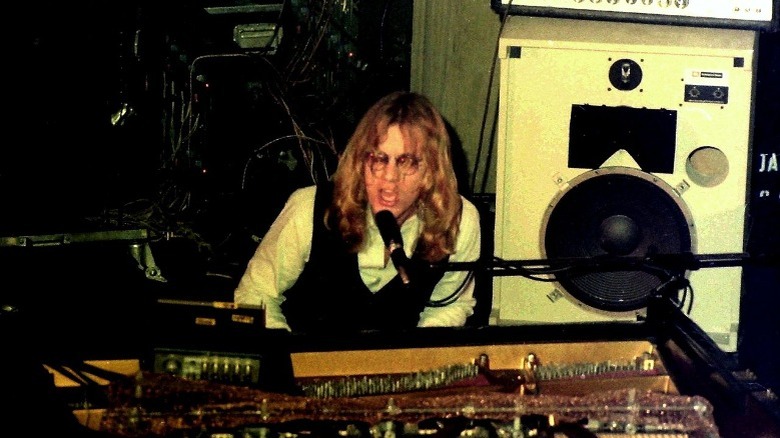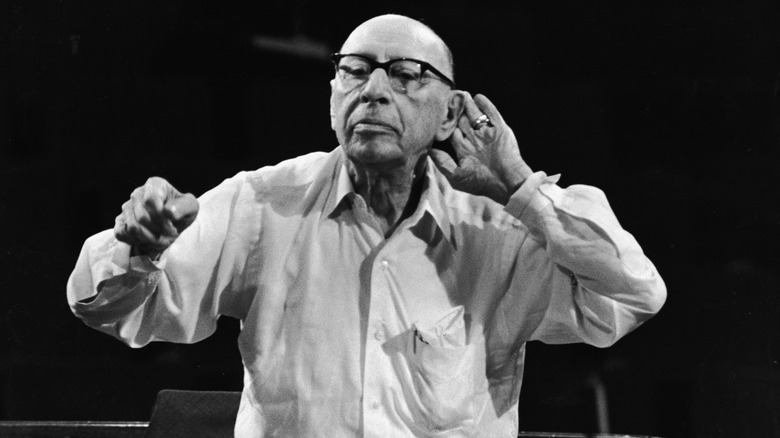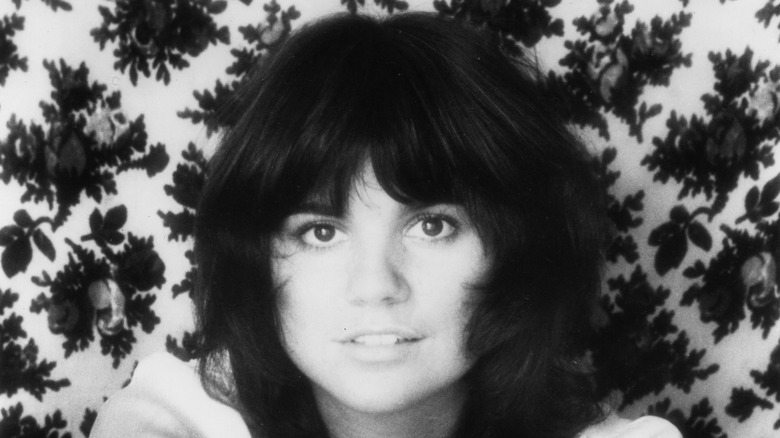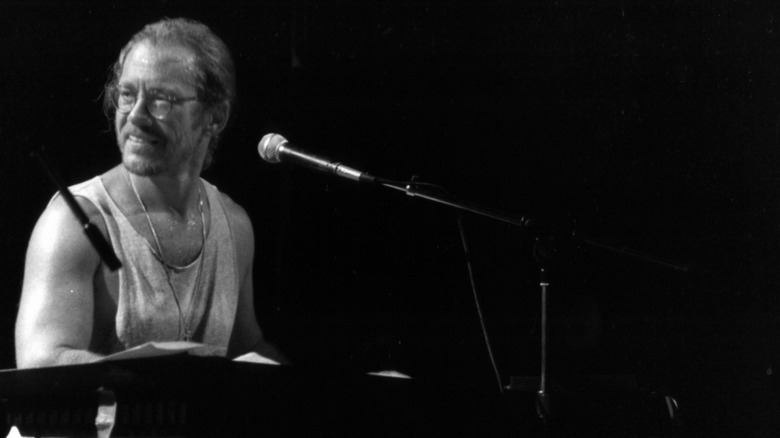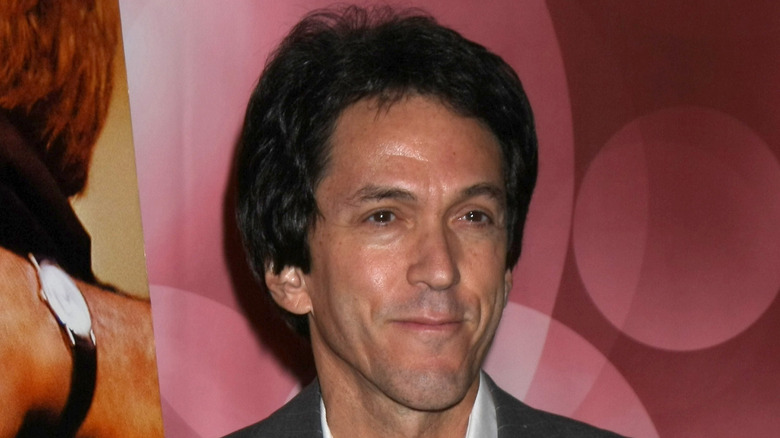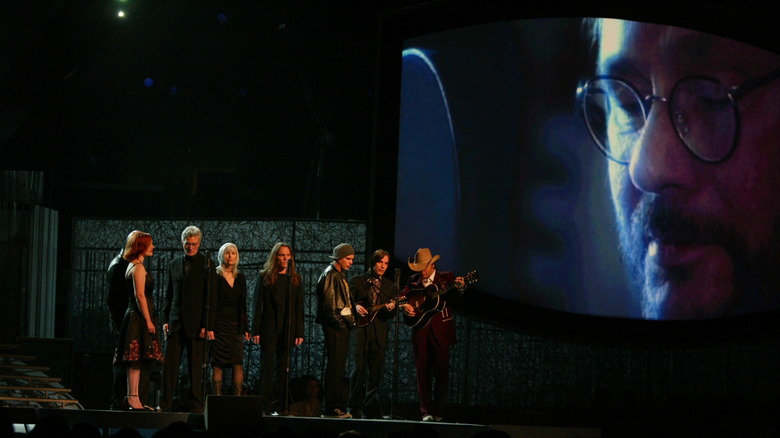The Untold Truth Of Warren Zevon
In the world of rock, there have been few more singularly idiosyncratic artists than Warren Zevon. Casual listeners may only be familiar with him from a handful of tunes, notably the borderline novelty song "Werewolves of London," which was recorded with an assist from Fleetwood Mac's rhythm section and was famously jacked by Kid Rock for a terrible song that you'd be more than forgiven for forgetting.
But those who followed his work knew that Zevon was much, much more than one goofy song; his lyrics, which could turn on a dime from acerbic and witty to insightfully heartfelt, earned him a mountain of respect among his peers, and his distinctive gravelly baritone was like no other voice in popular music.
Zevon's lifelong battle with a number of formidable demons ended in 2003, when he passed away from lung cancer at the age of 56. But as unfortunately short as his life was, it was also incredibly full, rife with the kinds of high peaks and low, low valleys that can (and did) create fodder for some pretty incredible music. Here are some details that even hardcore fans may not know about a complicated man, an incredible artist, the self-proclaimed Mr. Bad Example — the late, great Warren Zevon.
Warren Zevon's father worked for mobsters
Warren Zevon's songs were always filled with colorful characters and rough-and-tumble narratives, and as it turns out, he came by his gift for these things quite honestly. According to the Russian Heritage Museum, his father, William Zevon was a Russian immigrant who settled on the questionable American Dream of becoming a mobster; his underground nickname was "Stumpy," which sounds like the stuff of fiction, but apparently is not.
As detailed in "I'll Sleep When I'm Dead," a memoir written by Warren Zevon's ex-wife Crystal based on family members' recollections and her own conversations with her husband (via the New York Times), Stumpy's first connection upon his arrival in Chicago was the infamous mob boss Sam Giancana, and after relocating to Los Angeles, he became involved in handling illicit bets for the equally infamous Mickey Cohen. Stumpy encouraged young Warren's interest in music in a manner befitting his profession: Crystal Zevon wrote that Stumpy vanished one Christmas Eve to go out gambling, and returned hauling a piano that he'd won in a poker game.
His parents had a tumultuous relationship
By this time, Stumpy and his wife Beverly, Warren Zevon's mother, had already separated, and not for the first time. Beverly had moved across the country to Fresno, California, and Stumpy was in town for a visit and an attempted reconciliation. Crystal Zevon wrote in her book that Beverly was a devout Mormon, and her Odd Couple-like pairing with a shady gangster led to exactly the kinds of, er, disagreements that one might expect.
This is illustrated nicely, or rather not-so-nicely, by the tussle that ensued after Stumpy's Christmas gift to Warren. Crystal Zevon wrote that Beverly insisted that the "headache machine" be immediately evicted from her house, and that Warren — who, of course, was already enamored of the thing — "silently cheered on Stumpy" as he grabbed a huge carving knife and, expressionless, chucked it at Beverly's head, just barely missing her. Obviously, this led to yet another separation — but by the time Warren was in junior high, the pair was giving it another shot, this time in the Los Angeles neighborhood of San Pedro.
If you or someone you know is dealing with domestic abuse, you can call the National Domestic Violence Hotline at 1−800−799−7233. You can also find more information, resources, and support at their website.
Warren Zevon studied music under a contemporary of Igor Stravinsky
As a tween in San Pedro, Warren Zevon homed in briefly on playing the trumpet, and he was lucky enough to be a student — for a short time, at least — of Robert Craft, an American conductor who enjoyed a strong professional association with the legendary Russian composer Igor Stravinsky. According to an Arkansas Online piece on Zevon, he even visited Stravinsky's Los Angeles home as a teenager, accompanying Craft on one of his visits, and Craft's description of the event is as eloquent as it is jaw-dropping.
"Mr. Zevon on that first visit reminded me of my own first meeting with Stravinsky, though I was 10 years older and much less intelligent," Craft remembered. "As always, Stravinsky was warm and hospitable, and Mr. Zevon, whatever he thought, was in perfect control. Part of Stravinsky's late-afternoon work ritual was to drink scotch and eat a piece of Gruyere ... Stravinsky invited his young guest to join him in the nourishment. Mr. Zevon betrayed no effects from the liquid and we chose a time to meet again the following week." The fact that the teen was able to handle his liquor would not bode well for his future, but fortunately, drinking wasn't the only skill Zevon acquired while seemingly much too young.
He first developed a reputation as a songwriter
In a retrospective on Warren Zevon's life and career, the Guardian noted that he dedicated himself to songwriting at a young age, and he saw the fruits of his labor reasonably quickly. One early effort, "She Quit Me," reached a fairly wide audience in an improbable fashion: After undergoing light surgery on its title, it was recorded as "He Quit Me" by vocalist Leslie Miller, and featured on the soundtrack to the X-rated feature "Midnight Cowboy." That film famously became the first and only one to be slapped with that rating and also earn an Academy Award for Best Picture.
While Zevon's first two studio albums, 1969's "Wanted Dead or Alive" and 1976's "Warren Zevon," didn't get a heck of a lot of attention from the music-buying public, his songwriting skills got plenty from other artists. Notably, his sophomore effort's tracks "Poor, Poor Pitiful Me" and "Hasten Down the Wind" were expertly covered by the great Linda Ronstadt, who used the latter as the title track of her platinum-selling 1976 album. According to WarrenZevon.org, other Zevon tunes to be grabbed up by other artists include "Reconsider Me" (The Pretenders, Stevie Nicks), "Play It All Night Long" (Bruce Hornsby, Drive-By Truckers), "Lawyers, Guns, and Money" (Rick Derringer), and "Mohamed's Radio" (Ronstadt again).
A famous friend helped Warren Zevon land a record deal
Among Warren Zevon's most prominent fans early in his career: Singer-songwriter Jackson Browne, who had carved out a highly successful career as a solo artist (and penned hit tunes for the likes of the Nitty Gritty Dirt Band and the Eagles) by the time Zevon was searching for a new label in the mid-'70s. Zevon's work struck a major chord with Browne, and the two became quick friends — but according to the Guardian's piece, Browne was a bit worried for his new buddy's career prospects. "He was unique," Browne said, "and, for that reason, I thought there was a chance he might not get a record deal."
Indeed, he may not have, as Zevon's only previously released work was his 1969 debut, which wasn't a super-effective showcase for his talents. But Browne personally implored the head of his own label, David Geffen, to sign Zevon, and even produced his self-titled sophomore album and his next — 1978's "Excitable Boy," which is as close to a masterpiece as anything the late '70s had to offer. The full range of Zevon's artistry, from wistful sentimentality ("Johnny Strikes Up the Band") to heartfelt balladry ("Accidentally Like a Martyr," the Browne-penned "Tenderness on the Block") to bizarre dark humor ("Werewolves of London" and the jaw-dropping title track) were on display here, and also included was the tune which would go on to become his signature — a hard-boiled, horror-tinged, subtly hilarious tune about a headless man and his gun.
He wrote his signature song with an actual mercenary
"Roland the Headless Thompson Gunner" is just your average tune about a Norwegian mercenary, betrayed and murdered by his own comrade, who returns as a headless spirit to seek vengeance with his trusty Thompson gun. The eerie composition and vocal delivery, lightly sprinkled with winking humor in lines like "Roland aimed his Thompson gun, he didn't say a word" (of course he didn't, he had no head) seem like pure, distilled, Zevon — but for this song, he had a very interesting writing partner.
In the liner notes to Zevon's greatest hits collection "Anthology" (via American Songwriter), he revealed that the idea to write a song about a mercenary came courtesy of an actual mercenary, whom he met during a brief stay overseas. "In 1974, I ran off to Spain and got a job in an Irish bar called the Dubliner, in Sitges, on the Costa Brava," Zevon recalled. "The proprietor was a piratical ex-merc named David Lindell. He and I wrote this song at the bar one afternoon, over many jars." Lindell's contributions likely helped to add a gritty layer of real-world grounding to the song, with lyrics like "The deal was made in Denmark on a dark and stormy day/So he set out for Biafra to join the bloody fray," referencing actual conflicts of the time.
Warren Zevon struggled with alcoholism and OCD
Warren Zevon's struggles with the bottle are well-documented; according to the Guardian's piece, alcoholism reared its ugly head early in his career and grew increasingly worse. While that struggle didn't have much of an effect on his musical output, it certainly took a toll on his personal relationships, including his marriage to Crystal, who spoke about their troubles after Zevon's death. "I never didn't love him," she said. "I left because he was playing with guns, because the alcoholism had gotten so bad and because I had a child ... we always stayed friends and expected to get back together one day, and we almost did, at the end."
Zevon got clean in 1986, but when he did, an unexpected complication arose: undiagnosed Obsessive Compulsive Disorder, which his alcohol intake had previously helped to mask. Fortunately, he happened to have a neighbor who was familiar with the condition — actor and musician Billy Bob Thornton, who helped him identify and cope with the disorder.
If you or anyone you know is struggling with addiction issues, help is available. Visit the Substance Abuse and Mental Health Services Administration website or contact SAMHSA's National Helpline at 1-800-662-HELP (4357).
He had a soft spot for pro sports
Warren Zevon was never terribly public about his sports fandom, but it's safe to say he had an affinity for jocks — he penned more awesome tunes about sports. In a 2007 interview (via Fox Sports), Crystal Zevon revealed that her husband "envied and admired sports figures" — so, for example, when he heard that Boston Red Sox pitcher Bill Lee had a tendency to quote his lyrics in interviews, Zevon went ahead and wrote a song about him.
Also singled out for that honor was legendary boxer Ray "Boom Boom" Mancini, whose eponymous Zevon tune contained a chorus that any '70s fan of the sweet science could get behind: "Hurry home early/Hurry on home/Boom Boom Mancini's fighting Bobby Chacon" (via Las Vegas Review-Journal).
But it may be that Zevon's biggest sports obsession was hockey, for he simply couldn't find a favorite player to immortalize in song. Instead, he paid homage to the entire sport with the awesomely-titled "Hit Somebody! (The Hockey Song)," which he wrote at the suggestion of his friend, author Mitch Albom (via Meadville Tribune).
Warren Zevon felt a special kinship with prose writers
Given the literary quality of Warren Zevon's lyrics, it will probably come as no surprise to learn that he also held a special place in his heart for authors, and Mitch Albom was one of many that he counted among his friends. In an essay on his website after Zevon's death, Albom wrote, "Warren and I became friends in the mid-'90s when he came to play with a novelty band of writers that I belong to. Warren loved writers. His apartment was high walls of books. His references were [Franz] Kafka or [Kurt] Vonnegut or Carl Hiaasen."
Among the other current and former members of that band, the Rock Bottom Remainders (via the band's website), are humorist Dave Barry, legal thriller novelist Scott Turow, "The Simpsons" creator Matt Groening, and Master of Horror Stephen King, who also penned a tribute to Zevon by way of the foreword to his 2013 novel "Doctor Sleep." Zevon occasionally sat in with the Remainders, and King dedicated the novel to his friend (via Something Else Reviews). "With Warren beside me, matching me note for note and laughing his fool head off, I always had a blast," he wrote. "Warren, this howl is for you, wherever you are. I miss you, buddy."
He seemed to know he would die young
According to the Guardian, while Warren Zevon cultivated an image as kind of a badass, he was terrified of two things: Cancer, and doctors, whom he was always afraid would tell him he had cancer. His fear of his own mortality and the medical profession was evident in songs like "Don't Let Us Get Sick" and "My S***'s F***ed Up." The latter, typical of Zevon's sardonic humor, has perhaps the most morbidly hilarious opening lyrics in all of rock: "Well, I went to the doctor/I said, 'I'm feeling kind of rough'/'Let me break it to you, son/Your s***'s f***ed up.'/I said, 'My s***'s f***ed up?/Well, I don't see how'/He said, 'The s*** that used to work/It won't work now.'"
After his cancer diagnosis, Zevon was openly regretful about the fact that he had avoided so much as a routine physical for so long, yet he seemed to be incapable of remarking on even so grim a subject without his trademark dark humor. On his friend David Letterman's talk show, he said, "I might have made a tactical error not going to a physician for 20 years. I have a form of lung cancer that spread. It means you better get your dry cleaning done on special" (via Rolling Stone).
Warren Zevon was the only guest to get a full hour on David Letterman's show
David Letterman wasn't just a friend of Warren Zevon, but a huge fan — "the best friend my music ever had," the musician said during the show — and as reported by Ultimate Classic Rock, Zevon had occasionally taken over for Paul Schaffer as the show's bandleader. Letterman insisted on booking Zevon as soon as possible after learning of his diagnosis — and, for the first and only time, he dedicated his entire hour to a single guest.
It was during this appearance that Zevon offhandedly gave Letterman's viewers a piece of advice that would become immortal, and serve as the title of a 2004 tribute album: "Enjoy every sandwich" (via Rolling Stone). Though he struggled at times, he broke up his long conversation with his old buddy with rousing performances of three tunes: "Mutineer," "Genius," and at Letterman's request, a spine-tingling, show-closing rendition of "Roland the Headless Thompson Gunner."
He used his last months to make his most acclaimed album
Warren Zevon was given just months to live after his diagnosis, but according to a New York Times Magazine piece, he opted to use the time doing things he loved: Spending time with his family, drinking (he fell all the way off the wagon), and recording a farewell album. ”I just thought right away that I wanted to work,” he told the Times. ”Work is the most effective drug there can possibly be. I'm on the periphery of a lot of despair, of course — you'd have to be stupid not to be. I have my moments when I'm not too thrilled about this whole deal. But at the same time, the songs have never come like this ... I'm probably in the [most intense] creative period of my life.”
That album, "The Wind" — with its devastatingly-titled single "Keep Me In Your Heart" — featured a mind-blowing roster of guests such as Tom Petty, Bruce Springsteen, Don Henley, Ry Cooder, Jackson Browne, Emmylou Harris, and even his old pal Billy Bob Thornton. It was nominated for five Grammys (via the official website), won two, and was his first effort in over two decades to go Gold — a fitting end to a fascinating, singular life, and a stellar career. Warren Zevon passed away on September 7, 2003, just two weeks after its release.
